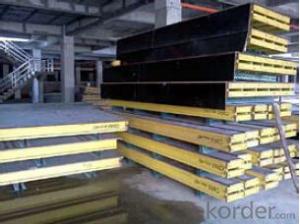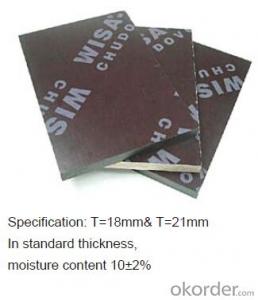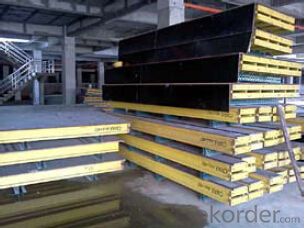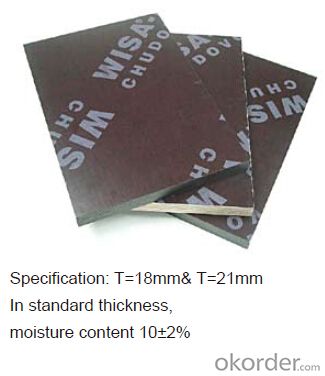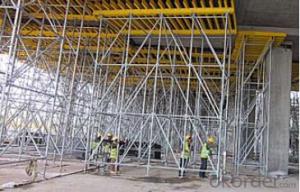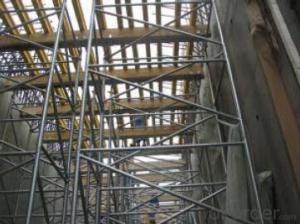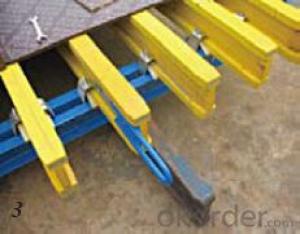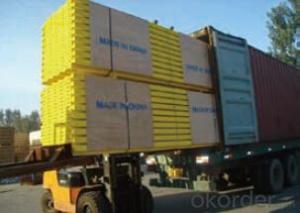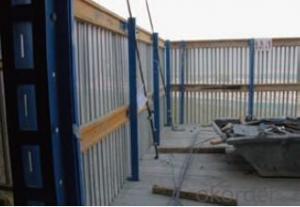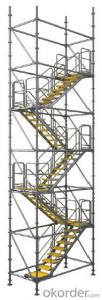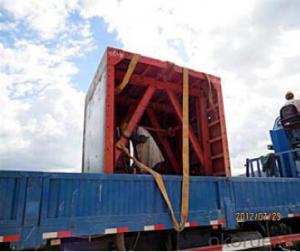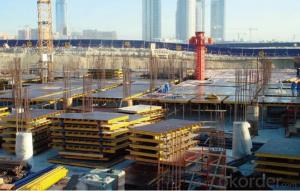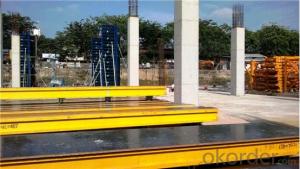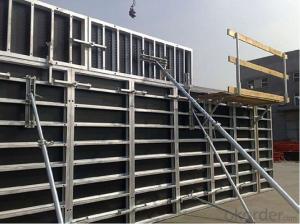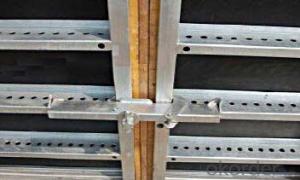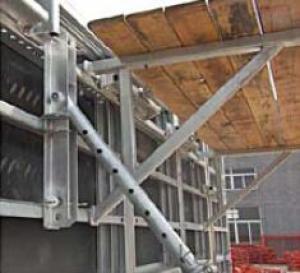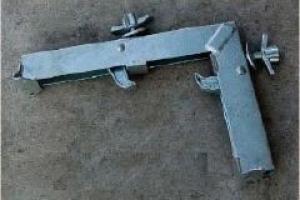Plywood formwork system for Formwork and Scaffolding
- Loading Port:
- Tianjin
- Payment Terms:
- TT OR LC
- Min Order Qty:
- 50 g/m²
- Supply Capability:
- 1000 g/m²/month
OKorder Service Pledge
Quality Product, Order Online Tracking, Timely Delivery
OKorder Financial Service
Credit Rating, Credit Services, Credit Purchasing
You Might Also Like
Plywood --- make perfect concrete surface
WISA-Form Birch is a coated special plywood using in the formwork systems where high
requirements are set on the concrete surface and the times of reuses.
With CNBM timber beam & WISA plywood, the formwork is low weight but high load capacity, it is
widely used in construction.
Characteristics:
◆ Component with high standardization.
◆ Assembling in site, flexible application.
◆ Light weight, easy transportation and storage.
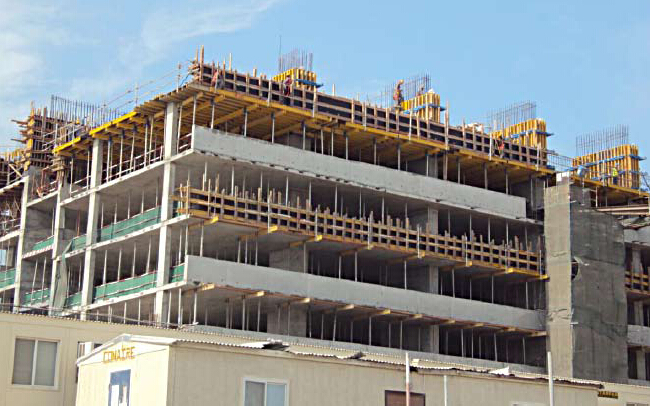
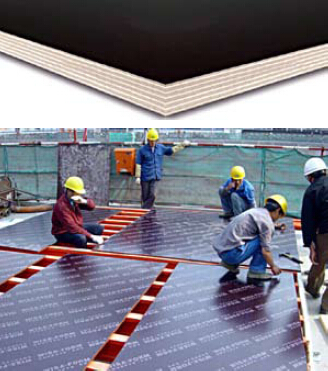
- Q: What are the different types of steel formwork systems available?
- There are several different types of steel formwork systems available, including traditional steel formwork, modular steel formwork, and tunnel formwork. Traditional steel formwork consists of steel panels and supports that are assembled on-site to create the desired formwork structure. Modular steel formwork, on the other hand, is pre-assembled in a factory and can be easily transported and installed. Lastly, tunnel formwork is a specialized type of steel formwork used for constructing tunnels, where the formwork is moved forward as the tunnel progresses.
- Q: How does steel formwork handle formwork repositioning?
- Steel formwork is highly durable and flexible, making it ideal for handling formwork repositioning. Its sturdy construction allows for easy dismantling, transportation, and reassembly in new locations. Steel formwork systems typically consist of modular panels that can be easily adjusted and reconfigured to accommodate different shapes and sizes of concrete structures. This versatility and adaptability make steel formwork a preferred choice in construction projects where formwork repositioning is required.
- Q: How does steel formwork prevent concrete shrinkage and cracking?
- Steel formwork helps prevent concrete shrinkage and cracking by providing strong and rigid support during the curing process. When concrete is poured into the steel formwork, it takes the shape of the structure being built and hardens over time. The steel formwork acts as a mold, holding the concrete in place and preventing it from shrinking or cracking as it dries. One of the main causes of concrete shrinkage and cracking is the loss of moisture during the curing process. As the water in the concrete evaporates, it causes the material to shrink. This shrinkage can lead to cracks forming in the concrete if it is not properly supported. Steel formwork helps prevent this shrinkage by providing a tight and secure enclosure for the concrete. It ensures that the concrete retains its moisture and does not dry out too quickly. This slow and controlled drying process allows the concrete to cure evenly and reduces the likelihood of shrinkage and cracking. Additionally, steel formwork provides stability and support to the concrete, preventing it from moving or shifting as it hardens. This stability helps to distribute the forces and stresses evenly, reducing the risk of cracking or structural failure. Furthermore, the smooth and rigid surface of steel formwork helps to achieve a high-quality finish on the concrete. This prevents any irregularities or imperfections that may weaken the structure or make it more susceptible to cracking. In summary, steel formwork plays a crucial role in preventing concrete shrinkage and cracking by providing support, stability, and moisture retention during the curing process. Its strong and rigid structure ensures that the concrete remains intact and achieves a high-quality finish, reducing the risk of structural issues and enhancing the durability of the construction.
- Q: How does steel formwork impact the overall sustainability of a project?
- Steel formwork can have a significant impact on the overall sustainability of a project. Firstly, steel is a highly durable material that can withstand repeated use, which means that steel formwork can be reused multiple times before reaching the end of its life cycle. This reusability reduces the need for frequent replacements, minimizing the consumption of materials and the waste generated during construction. Additionally, steel formwork is known for its strength and structural stability, allowing for the construction of robust and long-lasting structures. This means that buildings constructed with steel formwork are more likely to have a longer lifespan, reducing the need for frequent renovations or demolitions. Consequently, this leads to a decrease in the consumption of resources and the associated carbon emissions that come with new construction. Moreover, steel is a highly recyclable material, and steel formwork can be easily recycled at the end of its life cycle. The recycling process of steel requires less energy compared to the production of new steel, thereby reducing the carbon footprint of a project. By choosing steel formwork, construction projects can contribute to the circular economy by promoting the use of recycled materials and reducing landfill waste. Furthermore, steel formwork offers enhanced efficiency in construction processes. Its modular nature and ease of assembly make it a time-saving option, reducing construction time and, consequently, the energy consumption required for on-site operations. The accelerated construction process also minimizes disruption to the surrounding environment, reducing the overall environmental impact of the project. Lastly, steel formwork can contribute to the overall sustainability of a project by providing a safer working environment for construction workers. Its strength and stability ensure that the formwork remains secure during concrete pouring, minimizing the risk of accidents and injuries. This promotes the well-being of workers and aligns with the principles of social sustainability. In conclusion, steel formwork positively impacts the overall sustainability of a project by minimizing material consumption, reducing waste generation, promoting recycling, enhancing construction efficiency, and providing a safer working environment. Its durability, reusability, and recyclability contribute to the conservation of resources, reduction of carbon emissions, and long-term viability of structures. By opting for steel formwork, construction projects can advance sustainability goals and contribute to a more environmentally and socially responsible built environment.
- Q: Can steel formwork be used for both interior and exterior concrete finishes?
- Yes, steel formwork can be used for both interior and exterior concrete finishes. Steel formwork is known for its strength and durability, making it suitable for a variety of applications. Whether it is for interior walls, columns, or exterior slabs, steel formwork provides a smooth and consistent surface for the concrete to be poured into. Additionally, steel formwork can be easily customized and adjusted to meet specific project requirements, making it a versatile choice for both interior and exterior concrete finishes.
- Q: How does steel formwork handle moisture and humidity?
- Steel formwork is highly resistant to moisture and humidity due to its non-porous nature. Unlike other materials, steel does not absorb water, preventing any damage caused by swelling, warping, or decay. Additionally, steel formwork is coated with protective layers, such as galvanization or epoxy, which further enhance its resistance to moisture and humidity, ensuring its durability and longevity.
- Q: How is steel formwork removed after concrete has cured?
- Typically, steel formwork is taken down in a systematic manner once the concrete has fully cured. The first step involves removing any props or supports that were utilized during the pouring and curing process. These supports are usually adjustable and can be easily taken apart. Next, a thorough inspection of the formwork panels is conducted to ensure that the concrete has completely cured and is ready to be detached. Once this confirmation is made, the formwork panels are disconnected from one another, starting at the top and working downwards. To dismantle the formwork, specialized tools like formwork wedges or clamps are typically used to release the connections between the panels. These connections are usually designed to be easily disassembled, allowing for efficient removal. After the panels are disconnected, they are carefully lifted away from the cured concrete using cranes, forklifts, or other lifting equipment, depending on their size and weight. During the removal process, great care must be taken to prevent any damage to the concrete structure. The formwork panels are lifted with caution, ensuring that they do not scrape or impact the concrete surface. Additionally, any residue or debris that may have accumulated on the formwork panels during the curing process should be cleared away before lifting them. Once the steel formwork is entirely removed, it can be stored for future use or disassembled for recycling. Proper storage and maintenance of the formwork are crucial to ensure its longevity and cost-effectiveness for future construction projects. In conclusion, the systematic removal of steel formwork following concrete curing involves the careful disassembly and lifting of the formwork panels. By following these steps, the integrity of the concrete structure is maintained, while allowing for the reuse or recycling of the formwork.
- Q: What are the different types of formwork spacers used in steel formwork?
- Various types of formwork spacers are commonly utilized in steel formwork. These spacers play a crucial role in maintaining the desired spacing between the formwork and reinforcement, thus ensuring the structural integrity of the concrete structure. Here, we present a range of formwork spacers frequently employed in steel formwork: 1. Plastic Spacers: Due to their lightweight nature, durability, and easy installation, plastic spacers are extensively employed in steel formwork. They are typically crafted from top-notch plastic materials and come in diverse shapes and sizes to accommodate different reinforcement requirements. 2. Steel Spacers: Steel spacers are another prevalent type of formwork spacer used in steel formwork applications. Constructed from high-strength steel, they possess the capacity to withstand heavier loads. Steel spacers prove ideal for heavy-duty applications that necessitate added strength and durability. 3. Rubber Spacers: In steel formwork, rubber spacers are employed to provide a cushioning effect and prevent direct contact between the reinforcement and the formwork. These spacers are suitable for scenarios where vibration or movement is anticipated, as they efficiently absorb shocks and minimize the risk of damage. 4. Concrete Spacers: Concrete spacers primarily find utility in precast concrete applications. Comprised of concrete, they act as support structures, ensuring the correct spacing between the formwork and reinforcement is maintained. Concrete spacers are not only durable and easy to install but also offer exceptional stability during the casting process. 5. Combination Spacers: Combination spacers are versatile in nature, incorporating various materials such as plastic and steel to provide enhanced strength and stability. These spacers are designed to meet specific project requirements and offer a cost-effective solution for various steel formwork applications. To guarantee optimal performance and safety, it is imperative to select the appropriate formwork spacer type based on the project's specific requirements, encompassing load capacity, spacing needs, and environmental conditions. Seeking guidance from a structural engineer or construction professional can ensure the correct selection and installation of formwork spacers.
- Q: How does steel formwork affect the overall architectural aesthetics of the structure?
- Steel formwork can have a significant impact on the overall architectural aesthetics of a structure. The use of steel as a material for formwork can provide a sleek and modern appearance to the building. Its smooth and rigid surface allows for precise and clean lines, resulting in a more refined and elegant look. Steel formwork also offers great flexibility in terms of design possibilities. It can be easily shaped and molded into complex and intricate patterns, allowing architects to create unique and visually appealing structures. This versatility opens up a wide range of architectural possibilities, enabling the creation of buildings with distinct and eye-catching features. Furthermore, steel formwork provides a high level of structural stability, which enhances the overall aesthetics of the structure. The use of steel ensures that the formwork remains strong and sturdy, even under heavy loads, which is crucial for creating large and imposing architectural designs. The ability to use steel formwork in such constructions allows architects to achieve bold and impressive architectural forms that might not be possible with other materials. In addition to its visual impact, steel formwork also offers various practical advantages. It is a durable and long-lasting material that can withstand harsh weather conditions, making it suitable for both indoor and outdoor applications. Steel formwork is also highly resistant to fire, corrosion, and pests, further ensuring the longevity and integrity of the structure. Overall, steel formwork plays a crucial role in shaping the architectural aesthetics of a structure. Its smooth surface, flexibility in design, structural stability, and durability contribute to creating visually appealing and iconic buildings. By choosing steel formwork, architects can achieve both functional and aesthetic goals, resulting in structures that are not only beautiful but also reliable and long-lasting.
- Q: How does steel formwork handle extreme weather conditions?
- Steel formwork is highly durable and can withstand extreme weather conditions with ease. Its strength and resilience make it suitable for use in various climates, ranging from hot and humid to cold and snowy. In hot weather conditions, steel formwork remains stable and does not warp or deform due to high temperatures. Its high melting point ensures that it retains its shape and structural integrity even under intense heat. Additionally, steel formwork does not absorb moisture or expand, preventing any potential damage caused by expansion and contraction in hot and dry environments. In cold weather conditions, steel formwork remains unaffected by freezing temperatures and does not become brittle. It can withstand the weight of snow loads without any risk of collapse. Steel formwork also prevents the absorption of moisture, eliminating the risk of freeze-thaw damage. Furthermore, steel formwork is resistant to corrosion, making it suitable for use in areas with high humidity or exposure to saltwater. Its corrosion resistance properties ensure that the formwork remains strong and functional, even when exposed to extreme weather conditions over an extended period. Overall, steel formwork's ability to handle extreme weather conditions is a result of its exceptional strength, durability, and resistance to temperature variations, moisture, and corrosion. These qualities make it a reliable and long-lasting choice for construction projects in various climates across the globe.
Send your message to us
Plywood formwork system for Formwork and Scaffolding
- Loading Port:
- Tianjin
- Payment Terms:
- TT OR LC
- Min Order Qty:
- 50 g/m²
- Supply Capability:
- 1000 g/m²/month
OKorder Service Pledge
Quality Product, Order Online Tracking, Timely Delivery
OKorder Financial Service
Credit Rating, Credit Services, Credit Purchasing
Similar products
Hot products
Hot Searches
Related keywords
